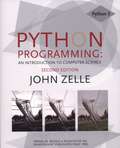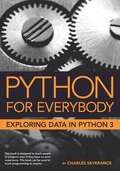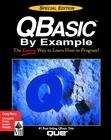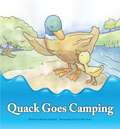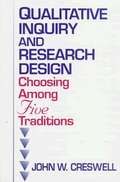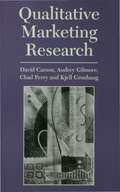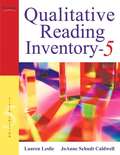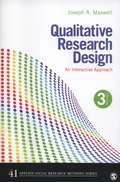- Table View
- List View
Python Programming: An Introduction to Computer Science
by John M. ZelleThis book is designed to be used as the primary textbook in a college-level first course in computing. It takes a fairly traditional approach, emphasizing problem solving, design, and programming as the core skills of computer science. However, these ideas are illustrated using a non-traditional language, namely Python.
Python for Everybody: Exploring Data Using Python 3
by Dr Charles R. SeverancePython for Everybody: Exploring Data Using Python 3
Qalupalik: Fearsome Monster of the Far North (Fountas & Pinnell Classroom, Guided Reading)
by Susan Layne Hannah MegeeNIMAC-sourced textbook
Qatar History and Citizenship - Private Schools - Grade 10
by the editors at Al Motahida GroupIn the context of the Qatar National Educational Vision 2030 for enhancement of the educational system, we are pleased to present tenth grade private school students with this academic resource for Qatar History and Citizenship. Through this resource, we aim to realise our vision to educate students about key events in the past and modern history, highlight the values of belonging, loyalty, and fidelity of our beloved Qatar. This resource sheds light on the active role that Qatar plays at the humanitarian level both in the Arabian Gulf region and internationally.
Qatar History and Citizenship - Private Schools - Grade 11
by the editors at Al Motahida GroupWe are delighted to present this academic resource to our dear eleventh level private school students entitled History of Qatar. It conforms to the Qatar National Vision 2030 which aims to support the educational system. We aim to achieve our vision by instructing students of the most important events of the past and the present time. This emphasises the ethics of affiliation, loyalty and devotion to the State of Qatar.
Qatar History and Citizenship - Private Schools - Grade 12
by the editors at Al Motahida GroupWe are delighted to present this academic resource to our dear twelfth level private school students entitled History of Qatar. It conforms to the Qatar National Vision 2030 which aims to support the educational system. We aim to achieve our vision by instructing students of the most important events of the past and the present time. This emphasises the ethics of affiliation, loyalty and devotion to the State of Qatar.
Qatar History and Citizenship - Private Schools - Grade 2
by the editors at Al Motahida GroupWe are delighted to present this academic source for our second grade students entitled History and Citizenship. History and citizenship represent a significant component in the mental and moral growth of students. It helps them to grasp the main features of Qatar and instills affiliation and pride for its roots. Students are enabled to interact positively with their society and with other individuals around them, leading to the development of their awareness and knowledge of the world. Appreciation of the world around them will enable students to understand the concept of cultural diversity among people in the world.
Qatar History and Citizenship - Private Schools - Grade 3
by the editors at Al Motahida GroupWe are delighted to present this academic source for our third grade students entitled History and Citizenship. History and citizenship represent a significant component in the mental and moral growth of students. It helps them to grasp the main features of Qatar and instills affiliation and pride for its roots. Students are enabled to interact positively with their society and with other individuals around them, leading to the development of their awareness and knowledge of the world. Appreciation of the world around them will enable students to understand the concept of cultural diversity among people in the world.
Qatar History and Citizenship - Private Schools - Grade 4
by the editors at Al Motahida GroupWe are delighted to present this academic source for our fourth grade students entitled History and Citizenship. History and citizenship represent a significant component in the mental and moral growth of students. It helps them to grasp the main features of Qatar and instills affiliation and pride for its roots. Students are enabled to interact positively with their society and with other individuals around them, leading to the development of their awareness and knowledge of the world. Appreciation of the world around them will enable students to understand the concept of cultural diversity among people in the world.
Qatar History and Citizenship - Private Schools - Grade 5
by the editors at Al Motahida GroupWe are delighted to present this academic source for our fifth grade students entitled History and Citizenship. History and citizenship represent a significant component in the mental and moral growth of students. It helps them to grasp the main features of Qatar and instills affiliation and pride for its roots. Students are enabled to interact positively with their society and with other individuals around them, leading to the development of their awareness and knowledge of the world. Appreciation of the world around them will enable students to understand the concept of cultural diversity among people in the world.
Qatar History and Citizenship - Private Schools - Grade 6
by the editors at Al Motahida GroupWe are delighted to present this academic source for our sixth grade students entitled History and Citizenship. History and citizenship represent a significant component in the mental and moral growth of students. It helps them to grasp the main features of Qatar and instills affiliation and pride for its roots. Students are enabled to interact positively with their society and with other individuals around them, leading to the development of their awareness and knowledge of the world. Appreciation of the world around them will enable students to understand the concept of cultural diversity among people in the world.
Qatar History and Citizenship - Private Schools - Grade 7
by the editors at Al Motahida GroupWe are delighted to present this academic source for our seventh grade students entitled History and Citizenship. History and citizenship represent a significant component in the mental and moral growth of students. It helps them to grasp the main features of Qatar and instills affiliation and pride for its roots. Students are enabled to interact positively with their society and with other individuals around them, leading to the development of their awareness and knowledge of the world. Appreciation of the world around them will enable students to understand the concept of cultural diversity among people in the world.
Qatar History and Citizenship - Private Schools - Grade 8
by the editors at Al Motahida GroupWe are delighted to present this academic source for our eighth grade students entitled History and Citizenship. History and citizenship represent a significant component in the mental and moral growth of students. It helps them to grasp the main features of Qatar and instills affiliation and pride for its roots. Students are enabled to interact positively with their society and with other individuals around them, leading to the development of their awareness and knowledge of the world. Appreciation of the world around them will enable students to understand the concept of cultural diversity among people in the world.
Qatar History and Citizenship - Private Schools - Grade 9
by the editors at Al Motahida GroupWe are delighted to present this academic source for our ninth grade students entitled History and Citizenship. History and citizenship represent a significant component in the mental and moral growth of students. It helps them to grasp the main features of Qatar and instills affiliation and pride for its roots. Students are enabled to interact positively with their society and with other individuals around them, leading to the development of their awareness and knowledge of the world. Appreciation of the world around them will enable students to understand the concept of cultural diversity among people in the world.
Qbasic by Example (Special Edition)
by Greg M. Perry Que Publishing StaffThis book began in 1978, when I first turned on a computer and opened a BASIC manual to page 1, having never touched a computer before. Since then, I have continued to learn and teach BASIC. From that first Microsoft BASIC language, I taught many others, but Microsoft's variants of BASIC continue to be my favorites and old standbys. I am glad that Mr. Gates and his crew at Microsoft continue to support this language; it looks as though they are dedicated, more than ever, to keeping the BASIC flame alive with QBasic.
Qualitative Consumer and Marketing Research (Review Of Marketing Research Ser.)
by Eileen Fischer Dr Russell W. Belk Robert V Kozinets- How is qualitative marketing and consumer research conducted today? <P><P> - What is rigorous research in this field? <P> - What are the new, cutting edge techniques? <P> Written for students, scholars, and marketing research practitioners, this book takes readers through the basics to an advanced understanding of the latest developments in qualitative marketing and consumer research. The book offers readers a practical guide to planning, conducting, analyzing, and presenting research using both time-tested and new methods, skills and technologies. With hands-on exercises that researchers can practice and apply, the book leads readers step-by-step through developing qualitative researching skills, using illustrations drawn from the best of recent and classic research. <P> Whatever your background, this book will help you become a better researcher and help your research come alive for others.
Qualitative GIS: A Mixed Methods Approach
by Sarah Elwood Meghan CopeGeographic Information Systems are an essential tool for analyzing and representing quantitative spatial data. Qualitative GIS explains the recent integration of qualitative research with Geographical Information Systems With a detailed contextualising introduction, the text is organised in three sections: Representation: examines how researchers are using GIS to create new types of representations; working with spatial data, maps, and othervisualizations to incorporate multiple meanings and to provide texture and context. Analysis: discusses the new techniques of analysis that are emerging at the margins between qualitative research and GIS, this in the wider context of a critical review of mixed-methods in geographical research Theory: questions how knowledge is produced, showing how ideas of 'science' and 'truth' inform research, and demonstrates how qualitative GIS can be used to interrogate discussions of power, community, and social action Making reference to representation, analysis, and theory throughout, the text shows how to frame questions, collect data, analyze results, and represent findings in a truly integrated way. An important addition to the mixed methods literature, Qualitative GIS will be the standard reference for upper-level students and researchers using qualitative methods and Geographic Information Systems.
Qualitative Inquiry and Research Design: Choosing among Five Approaches (2nd edition)
by John W. CreswellMany changes have occurred on the landscape of qualitative research, and these changes and my thinking about them are reflected in this second edition.
Qualitative Inquiry and Research Design: Choosing among Five Traditions (1st edition)
by John W. CreswellAn explanation of five approaches to qualitative research.
Qualitative Marketing Research
by David J. Carson Chad Perry Audrey Gilmore Kjell GronhaugAs the importance of marketing to business grows, and as new concepts and applications of marketing emerge and evolve, so too does the need for up-to-date market intelligence. This book recognizes that the contribution which qualitative research can make to market understanding and insight is immense, and that statistical information flows are never enough but need to be compounded by market intelligence gained through qualitative methods. Qualitative Marketing Research clearly explains the use and importance of qualitative methods, clarifying the theories behind the methodology and providing concrete examples and exercises which illustrate its application to Management Studies and Marketing. This book is intended for all students of marketing who are required to complete their studies with a dissertation or research project.
Qualitative Reading Inventory (5th Edition)
by Lauren Leslie Joanne Schudt CaldwellThis fifth edition emphasizes authentic assessment of children's reading abilities, from the most emergent readers to advanced readers.
Qualitative Research
by David SilvermanThis hugely successful textbook has been fully updated and revised to make it even more accessible and comprehensive than previous editions. New chapters have been added on a range of key topics, including grounded theory, research ethics and systematic review. This book draws on a stellar list of leading qualitative researchers, each of whom is writing on their own specialized area in qualitative research, but doing so in a way that is clear and accessible to students and those new to the field of qualitative methods. All chapters also have added features - such as internet links, questions for readers and recommended readings. Alongside its engaging and accessible style, these new features make Qualitative Research the ideal textbook for all students working within this field. This is a comprehensive and accessible first text on qualitative methods that boasts a who's who of leading qualitative methodologists and is a must-have book for any student involved in doing research.
Qualitative Research Design: An Interactive Approach (Third Edition)
by Joseph A. MaxwellQualitative Research Design: An Interactive Approach, Third Edition provides researchers and students with a user-friendly, step-by-step guide to planning qualitative research. Joseph A. Maxwell shows how the components of design interact with each other, and provides a strategy for creating coherent and workable relationships among these design components, highlighting key design issues. Written in an informal, jargon-free style, the book incorporates examples and hands-on exercises. "This book uses everyday language that will captivate students' attention and embed practical knowledge to supplement the technical. " --Gaetane Jean-Marie, University of Oklahoma "The key strengths of the text are the passion and the enthusiasm that Dr. Maxwell has for qualitative research after all these years. I feel I can also utilize these concepts on my own research team and take them out of the classroom and into research team meetings with colleagues. " --Deborah Gioia, University of Maryland, Baltimore "I really liked this book. I found myself taking notes and saying "yes" so many times because Maxwell captures the research process so well and provides many points worth quoting. As a faculty mentor, I particularly see the value of this book for my students who are conducting qualitative dissertations. " --Mary S. Enright, Capella University "The text is incredibly engaging and practical. . . So many of the issues raised in the book are central to qualitative research, yet often not explicitly discussed in 'public' venues. " - David Carlone, The University of North Carolina at Greensboro "I particularly like the interactive focus and believe that helps students to more realistically engage qualitative research design. It certainly lives up to its billing as a good guidebook, and I appreciate the fact that the author really concentrates on useful content, exercises, insights, and examples, and leaves extensive theory discussions to others. " - Sharon L. Caudle, Texas A & M University
